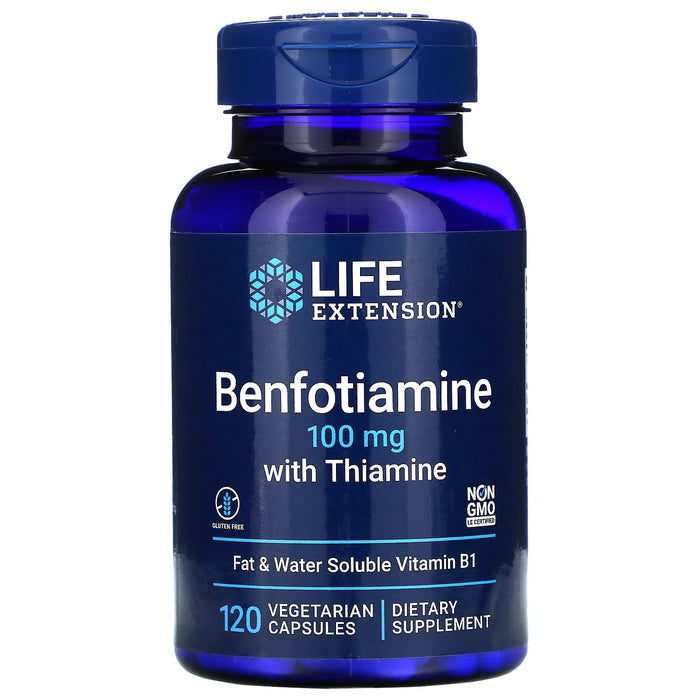




| Serving Size: 1 Vegetarian Capsule | ||
| Servings Per Container: 120 | ||
| Amount Per Serving | % Daily Value | |
| Thiamine (vitamin B1) (as thiamine HCl) |
25 mg |
2083% |
| Benfotiamine |
100 mg |
** |
| **Daily Value not established.
| ||
Support nerve health with Life Extension Benfotiamine with Thiamine, a vitamin B1 derivative.
Benfotiamine with Thiamine is a gluten-free, non-GMO LE Certified dietary supplement that supports healthy blood sugar metabolism, protects against advanced glycation end products, and promotes optimal thiamine levels for cardiovascular health. This formula contains a fat-soluble form of vitamin B1 (thiamine) that is more bioavailable than water-soluble thiamine and can easily penetrate cell membranes to support whole-body health.
Read the entire label and follow the directions carefully prior to use.
Take one (1) capsule four times daily, or as recommended by a healthcare practitioner.
Microcrystalline cellulose, vegetable cellulose (capsule), silica, vegetable stearate.
At Health Orchard, we are committed to providing accurate product information and images. However, manufacturers may update their product packaging or ingredients, and these changes may not be immediately reflected on our website. It's possible for products to be shipped with different packaging than what is shown online. For the most accurate and safe use of any product, we advise reading the product's label, warnings, and instructions rather than relying solely on the details provided by Health Orchard.
Benfotiamine with thiamine is a potent form of vitamin B1 that supports cellular energy production and helps protect against the harmful effects of high blood sugar. It may be particularly beneficial for individuals with diabetes or pre-diabetes, as it can help mitigate nerve damage and improve vascular health by reducing the formation of advanced glycation end products (AGEs).
Daily consumption of benfotiamine is generally considered safe for most individuals when taken at recommended dosages. It is a fat-soluble form of thiamine that has shown a good safety profile in numerous studies, with minimal risk of toxicity even at higher doses. However, as with any supplements, it's important to follow the recommended dosage guidelines and be aware of any potential interactions with medications or existing health conditions.
Benfotiamine has not been shown to have any adverse effects on kidney function in healthy individuals or those with existing kidney issues. In fact, some research suggests that benfotiamine may have protective effects on the kidneys, particularly in the context of diabetes-related kidney damage.
Thiamine (vitamin B1) is generally safe to take daily, as it is a water-soluble vitamin that is easily excreted by the body when consumed in excess. However, consult with a healthcare professional for personalized advice, especially if you have pre-existing health conditions or are taking medications.
Thiamine can be taken at any time of day, as it is not known to interfere with sleep or cause drowsiness. Some people may prefer taking it in the morning for a potential energy boost, while others may find it more convenient to take with their evening meal.
There are no specific groups of people who cannot take thiamine, as it is an essential nutrient that plays a crucial role in energy metabolism and nervous system function. However, individuals with certain rare genetic conditions or allergies should consult with a healthcare professional before taking thiamine supplements.